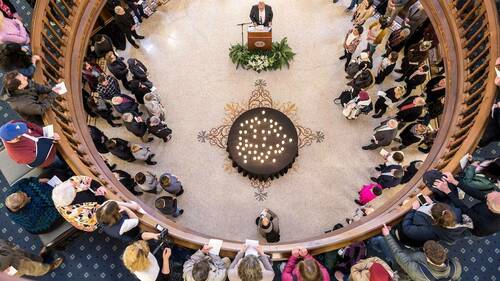
Words of comfort, unity and peace were woven into the prayers, reflections and hymns at an interfaith prayer service for victims of the recent shootings at two mosques in Christchurch, New Zealand. Several hundred members of the University of Notre Dame and local communities joined hands and voices in the rotunda of Main Building Thursday (March 21) to remember the victims and pray for an end to violence.
Imam Rashied Omar, a research scholar of Islamic studies and peacebuilding in Notre Dame’s Keough School of Global Affairs, opened the service with a Muslim prayer calling for peace. “Oh God, thou art peace. And peace emanates from Thee. We implore you to allow us to live and to subsist in peace.”
Rabbi Karen Companez, from Temple Beth-El in South Bend, presented a message of solidarity urging everyone to “forge and develop personal relationships with people who are somehow different from us. For there is way more that unites us than divides us.”
Student body vice president Corey Gayheart read a scripture passage before University President Rev. John I. Jenkins, C.S.C., delivered a message of healing and an end to violence.
“We come here today, whether Muslim, Jewish or Christian, to seek the peace that comes from God,” he said. “Whatever our faith tradition, let us ask God to grant us that peace in our hearts and with one another, particularly with those who differ in faith tradition, ethnicity, nationality or any other way.
“Let us not be tempted to respond to anger and hatred with more anger and hatred. Let us allow this terrible tragedy to inspire us to find a different path. Let us ask the God who is, as our Muslim brothers and sisters remind us, “merciful and kind,” to help us to find the connections, build the bridges and put on love, the perfect bond of unity.”
After a presentation of candles, one for each of the shooting victims, Ebrahim Moosa, Notre Dame professor of Islamic Studies in the Keough School of Global Affairs, offered a reflection on combating hate with revolutionary love and grace.
“Revolutionary love means we will rewrite our incomplete stories to make better and more complete stories where people of all colors and languages, ethnicities and faiths, will learn to respect each other and affirm each other’s dignity,” he said. “We vow to do so not with false and empty slogans of greatness and bravado, but with awareness of our deficiencies and vulnerabilities. Slowly and resolutely we will rebuild courage, love and mutual affirmation.”
Notre Dame’s Muslim Student Association President Muhammad Abubakar Mian closed the ceremony with a prayer and those in attendance together sang the hymn “We Shall Overcome”.
Rev. Pete McCormick, C.S.C., director of campus ministry, moderated the service and welcomed those in attendance to continue their prayerful reflections at the Grotto.